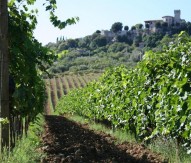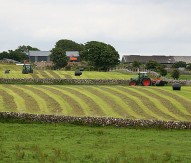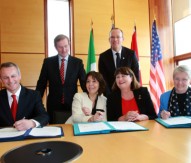
Farming research and innovation
Agriculture and the bioeconomy have long been a foundation of the European economy, most notably through the Common Agricultural Policy, which accounts for an estimated 32% of all EU spending in 2013.
Facing fresh challenges in the areas of food security and environmental sustainability – in addition to increased competition from abroad – the bioeconomy has been defined as one of the key societal challenges in Horizon 2020. Addressing MEPs at the European Parliament in Brussels, Máire Geoghegan-Quinn, European Commissioner for Research, Innovation and Science, began by emphasising that necessity is the mother of invention – a situation now recognisable in the agriculture sector, as the industry seeks to develop new approaches to farming.
“Solving the future challenge of producing more with less and in a more sustainable manner is not mission impossible, but it does require a fundamental shift towards a different growth path and a swifter transfer of new products or techniques into practice,” the Commissioner stated.
Horizon 2020 will double FP7 funding for agriculture and food research to over €4bn. With an increasing population, the Commissioner said that the European agricultural sector had a duty to tackle the forecast growth in food demand as well as addressing supply with a “sustainable, safe and secure” approach. She added that Europe had a responsibility to assist developing countries with creating sustainable agro-food sectors, although European farmers would also be facing tough competition for “limited and finite natural resources” that would ultimately place pressure on the ecosystem. Reducing food waste and tackling climate change would also be a priority, she added.
“We must…mitigate the impact of agriculture on climate change, but also enable agriculture to adapt to the impact climate change is putting on farming, forestry, fisheries and aquaculture,” Geoghegan-Quinn said.
“Climate change scenarios envisage a higher risk for crop failures and global food price spikes resulting from diminished harvests due to extreme weather events. The challenge is therefore not only to produce more, but also to produce more effectively and in more difficult conditions. It is essential that in addressing climate change, natural resources depletion and food waste, that agriculture is, from now on, seen as part of the solution rather than the problem.”
Horizon 2020 emphasises cross-border research co-ordination and collaboration as key avenues for resolving these problems. The Commission has encouraged the co-ordination of agricultural research between member states through the development of a Standing Committee on Agricultural Research and a Joint Programming Initiative (JPI) on Agriculture, Food Security and Climate Change. The EU has also developed a comprehensive strategy for the European bioeconomy to target these issues. Yet according to the Commissioner, strategies and increased investment under Horizon 2020 would not provide a silver bullet and crossing the ‘valley of death’ remains a key barrier.
“Over the past years, we have funded a lot of research which has had limited market impact on large-scale agricultural practice. This is because the research knowledge generated is not always market ready and needs better evaluation and direction towards uptake and exploitation. It is clear that an increase in research funding will work best if we can create the right environment for innovation to thrive. Agricultural innovation has to be more than just a one-way transfer of results to practice. Innovation prospers when the worlds of research and farming permanently interact by sharing knowledge, ideas and thinking together.”
The Commissioner hopes these objectives will be achieved through the European Innovation Partnership (EIP) for Agricultural Productivity and Sustainability. This form of research partnering, will encourage innovation co-operation under Horizon 2020.
“Beginning in 2012, the EIP forms partnerships between farmers, advisers, researchers, businesses, and other actors in ‘operational groups’ working on concrete innovation projects. This bottom-up approach enables ideas to come from the end users themselves…farmers, businesses and researchers will be brought closer together to work on new ideas where they are really needed. As these innovative ideas evolve, they can be brought closer to agricultural practice.”
Horizon 2020 will also assist in the work of the EIP by supporting transnational multi-actor projects, while the EIP will provide input to the research agenda. The Commissioner added that in addition to developing new innovative solutions, increasing awareness of new practices was also key.
“Horizon 2020 will address how best to disseminate projects that work particularly well – both locally and across borders and sectors – and how to accelerate technological transfer from the laboratory to the field. It will also deploy EIP operational groups, ERA networks, JPIs, technology platforms and transnational projects to highlight innovation possibilities that will facilitate this process. I believe that the EIP, in combination with Horizon 2020, will consolidate this participatory approach and stimulate innovation from all sides. A broad stakeholder involvement also facilitates the mainstreaming of new solutions since it strengthens focus, speeds up the acceptance and dissemination of new ideas, and helps target the research agenda.
Geoghegan-Quinn concluded: “I truly believe that Europe will only fully benefit from our excellent research and capitalise on our innovation potential when it becomes as easy for research institutes, universities and companies to partner and co-operate within the EU as it is within their own member states. Ultimately, by removing the obstacles to the free flow of researchers, data, ideas, and scientific knowledge in Europe, Horizon 2020 will bring us closer to a properly-functioning European Research Area.”
Commissioner Máire Geoghegan-Quinn




